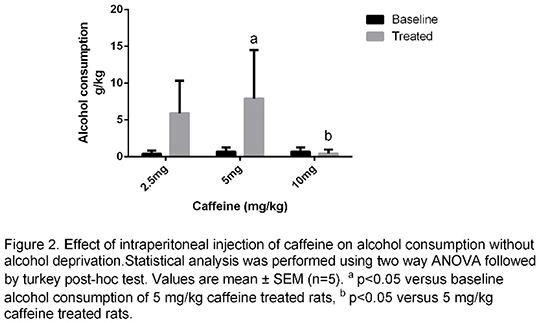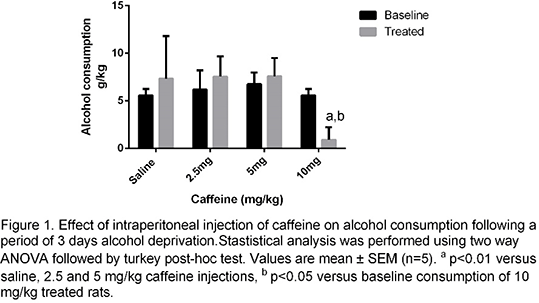| 156P London, UK Pharmacology 2016 |
Effect of caffeine on alcohol consumption in wistar rats
Introduction: The transient increase in alcohol consumption following a period of alcohol deprivation is known as alcohol deprivation effect (ADE). ADE models relapse and it is useful for screening the effectiveness of anti-relapse drugs1. Alcohol and caffeine are two widely used psychoactive substances and they are commonly co-ingested2. The study of the effect of caffeine on alcohol consumption following a period of deprivation has received little or no attention. Hence, the main aim of this study was to investigate the effect of caffeine on alcohol consumption with or without a period of alcohol deprivation.
Method: Male wistar rats were housed in individual cages and exposed to 10% alcohol (v/v) and water in an unlimited access two bottle free choice procedure over several weeks until a stable baseline for alcohol consumption was established2. Rats were then deprived of alcohol for 3 days and 15 minutes before re-exposure to alcohol; rats were injected with saline, 2.5, 5, or 10 mg/kg caffeine intraperitoneally. Both alcohol and water consumption were measured 24 hours after each injection. Rats with stable low baseline alcohol consumption without deprivation also received intraperitoneal injection of 2.5, 5 or 10 m/kg caffeine and alcohol and water consumption were measured as described before.
Results: There was no significant difference in alcohol consumption post-deprivation following injection with 4 ml/kg saline, 2.5 mg/kg or 5 mg/kg caffeine compared to baseline consumption. However, 10 mg/kg caffeine injection significantly (p<0.05) reduced alcohol consumption post-deprivation compared to baseline consumption. Also, 10 mg/kg caffeine injected rats showed a significant (p<0.01) reduction in alcohol consumption post-deprivation compared to saline, 2.5 mg/kg or 5 mg/kg caffeine injected rats (Figure 1). Additionally, in rats with very low baseline alcohol consumption which did not undergo alcohol deprivation, 5 mg/kg caffeine injection caused a significant (p<0.05) increase in alcohol consumption compared to baseline while 10 mg/kg caffeine injection significantly (p<0.05) reduced alcohol consumption compared to 5mg/kg caffeine injection (Figure 2).
Conclusion: The result shows that caffeine has a bi-modal dose-effect on alcohol consumption with or without a period of deprivation. The result also indicates that adenosine pathways may be involved in alcohol seeking behaviours and may hold promise as a potential target for treatment of alcohol relapse.
References:
1. Koros E et al. (1999). Alcohol & Alcoholism 34: 540-550.
2. Rezvani AH et al. (2013). Alcohol Clin Exp Res 37: 1609-1617.



